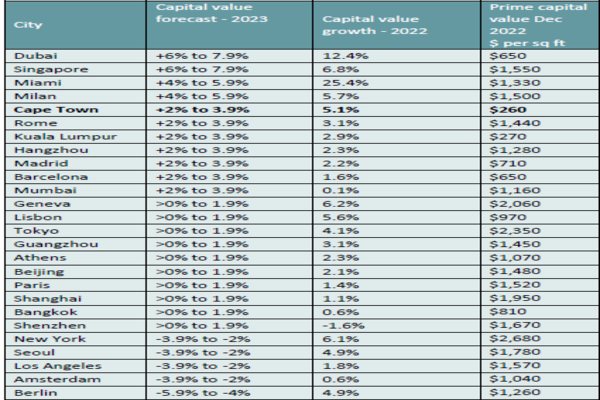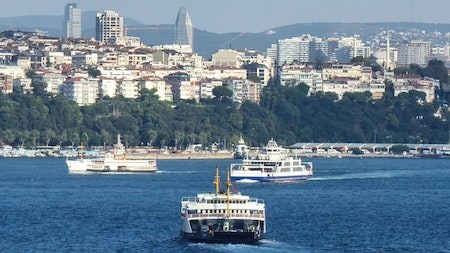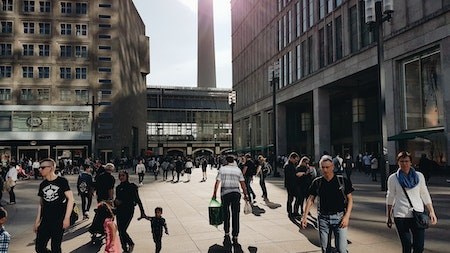Global real estate services provider, Savills, has ranked Cape Town fifth on its World Cities Prime Residential Index which highlights the key factors of prime capital value growth forecast for 2023 compared with capital growth value in 2022. The Index also details prime capital value per square foot as at December 2022.
Global stature of Cape Town
“Over decades, Cape Town has continued to feature on the global stage as a world-class city which garners attention from astute international and local investors in prime residential real estate”, said Dr Andrew Golding, chief executive of the Pam Golding Property group, which is Savills’ exclusive residential real estate partner in Africa.
“Scooping several awards at the 2022 World Travel Awards – including Africa’s Leading City Destination of the year, Cape Town is consistently in the spotlight as one of the world’s most desirable destinations not only to visit, but to live in, whether permanently or for several months of the year.”
While Savills’ Index reports that many of the prime residential world city markets are set for a slowdown in 2023 with an average price growth of 0.5% forecast across the 30 global cities monitored, Cape Town, with capital value growth of 5.1% in 2022, is forecast to enjoy capital value growth between 2% and 3.9% in 2023.
Basil Moraitis, regional head in the Western Cape for Pam Golding Properties, says it is interesting to note that of the 30 prime global cities cited in the Savills Index, Cape Town is the most affordable market for prime residential property with a capital value of just $260 per square foot. Notably, no other world city on their index is more affordable than Cape Town.
“This reinforces feedback from our international buyers that the value offered by prime real estate in Cape Town is very hard to beat. This is coupled with our sophisticated financial markets, common use of English for business and commerce, and world class properties offering ocean and mountain views, convenient access to wine farms and exceptional restaurants – all of which bodes well for investors and homeowners for property values going forward”.
“Cape Town has also seen a boom in not only the value of new development plans which have been approved by the City of Cape Town, but also the completion of new developments in the last year. This also underscores the demand for prime residential property across all price segments. Forecasts appear to indicate that if this trend continues, then the Western Cape will overtake Gauteng on a commercial basis in the next decade.”
Commenting on the Index, Paul Tostevin, head of Savills World Research, says recessionary conditions, a higher interest rate environment and inflation will weigh on prime residential performance, although the second half of the year holds some potential for global economic growth.
“The forecast growth of 0.5% is some way down on the 3.2% we saw last year, however the rarefied nature of prime residential coupled with a lack of stock, will prevent a sharper slowdown.”
Of the 30 major global cities in the Savills index, 17 will record slower growth than in 2022, with several posting declines. However, 13 out of the 30 are forecast to record equal or even slightly enhanced growth in 2023.
The regional hubs of Dubai and Singapore are forecast to top the global price charts in 2023. Both cities will continue to see sustained inflows of high-net-worth individuals, however they are not immune to higher interest rates and wider economic headwinds. Dubai’s forecast prime price growth of between 6% and 7.9%, for example, is muted compared with the 12.4% growth it recorded in 2022.
Similarly, Miami’s predicted prime capital value growth of between 4% and 5.9%, driven by a lack of supply at the top end of the market, is a significant downgrade on the 25.4% growth it recorded last year.
Savills World Cities Prime Residential Index: 2023 prime capital value growth forecast vs capital growth value in 2022.


Low to modest levels of capital value growth are forecast in the southern European cities of Lisbon, Athens, Rome, Milan, Barcelona and Madrid, where prime property is particularly coveted as a safe haven asset and inflation hedge in times of economic turmoil.
With capital value growth of 5.7%, Milan was southern Europe’s top performer in 2022 and it is expected to cement its position this year, with a price growth of between 4% and 5.9%.
Some cities felt global economic turbulence more than others, particularly in the second half of 2022. Rising interest rates hit Sydney particularly hard and Hong Kong’s lingering pandemic-related restrictions continued to hamper its prime residential markets.
Prime prices in Hong Kong fell by -8.5% in 2022 and global macro conditions are set to have further impact on the market with price falls of between -7.9% and -6% expected. However, the city will remain the world’s most expensive prime residential market at $4,070 per square foot.
Seoul and Tokyo were the two strongest performing cities in the Asia Pacific region last year, with prime prices rising 4.9% and 4.1% respectively.
With annual growth in 2022 ranging from +3% to -2%, the picture is mixed across major Chinese cities. The easing of Covid-19 restrictions towards the latter half of the year saw improved performance in the second half of 2022 in Hangzhou (1.8%) and Shanghai (2.0%). However, nationally low prime property volumes, the indebted real estate sector, weak consumer confidence and slower economic growth have all put downward pressure on price growth compared to previous years. Nevertheless, growth of up to 3.9% is forecast in the five mainland Chinese cities in the Savills index.
Writer : Pam Golding Properties




